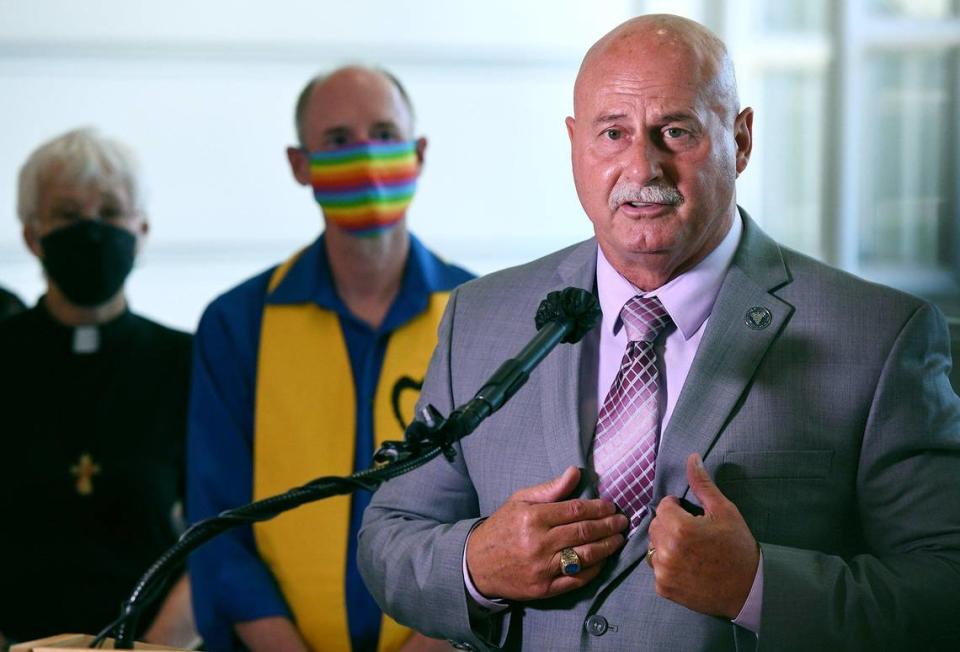Fresno voters are majority Democrat. Yet Republican Mayor Jerry Dyer is unopposed | Opinion
- Oops!Something went wrong.Please try again later.
If the outcome of Fresno’s 2024 mayoral election wasn’t a foregone conclusion already, things are even more definitive now.
Lourin Hubbard, four months after launching his bid to challenge Jerry Dyer, has bowed out. Leaving Fresno’s incumbent mayor as the only candidate in the field and the rest of us to ponder a puzzling political question:
In a city where registered Democrats greatly outnumber Republicans, why are none of the city’s leading Democrats willing to challenge a popular Republican mayor?
The short answer is pretty simple: Deep down they all know they’d lose. Still, there must be more to it.
Opinion
Asked about his own exit, Hubbard provided three reasons: a lack of support from fellow Democrats on the Fresno City Council; the difficulty of raising campaign donations; and threats and harassment (mainly online and via anonymous texts) made against himself and his wife.
“When I was making the rounds and talking to other politicos in town there was not an appetite to take on Jerry as much as there had been,” said Hubbard, who unsuccessfully ran for Congress in the 2022 special election to replace Devin Nunes.
Political campaigns also depend on donations. Dyer raised $950,000 during his first mayoral run and had $200,000 on hand as of March 23, according to his latest financial reports.
Hubbard, by contrast, said he raised just $20,000.
“Money was hard to come by,” Hubbard said. “There’s a lot of people that were supportive and wanted to help but don’t necessarily have the financial capabilities.”
Another factor is SB 1439, the anti “pay to play” law that took effect Jan. 1. The new legislation limits campaign contributions made to local elected officials (i.e. council members and supervisors) from real estate developers and other certain business interests to $250 per year.
However, it appears that mayors (at least those without direct control over city contracts, licenses and permits) are exempt. Which gives mayoral incumbents such as Dyer a built-in fundraising edge.
Dyer overcomes voter, city council odds
Not that Dyer necessarily needs one, as Fresno’s recent history makes clear. Two-term mayors Ashley Swearengin and Alan Autry were both re-elected with more than 70% of the primary vote. Jim Patterson got 53%, still enough to avoid a November rematch.
But unlike those Republican mayors, Dyer’s political might took root in much different soil.
None of them had to contend with a city council with a 6-1 Democrat majority. Or an electorate where Democrats (113,465 registered voters) hold a 16.4% edge over Republicans (70,279), according to the California Secretary of State’s latest data. Fresno’s exact split is 43.2% Democrat, 26.8% Republican and 22% No Party Preference.
Dyer hurdled those odds like Edwin Moses. To the point where, nine months before any votes are counted, no one with a shred of political clout wants to raise their hand against him.
Much of that has to do with Dyer’s effectiveness, both in terms of policy-making and his ability to reach across the aisle.
Remember in 2020 when local Republican interests poured money into the city council campaign of Nathan Alonzo? They did so fearful that the election of Tyler Maxwell would result in a veto-proof progressive council majority.
That certainly didn’t happen. Instead, Dyer and Maxwell forged an unlikely alliance.
“We don’t agree on everything, trust me,” said Maxwell, the current council president. “But I think we’ve both been pleasantly surprised by how closely our values align when it comes to what we want for this city.”
To say Dyer and the city council have gotten along surprisingly well is an understatement.
The only real point of contention occurred last August when the council overrode a mayoral veto for the city to serve as a pass-through entity for state funding for Planned Parenthood.
Dyer also avoided a major conflict in the initial months of his administration by changing his mind over raising the rainbow flag in front of City Hall.

Hubbard: People wanted me to go after Dyer
For his part, Hubbard credited Dyer for working with council members to create policy and for serving as an effective “statesman.”
“I never bought into the theory that Jerry was going to be Trump-like. He never had that type of persona when I interacted with him,” Hubbard said.
“A lot of people, especially early on in this race, wanted me to go after Jerry because of his past (as Fresno’s police chief). There’s a lot of people that told me if you knew Jerry 20 years ago, you would not like this man at all. That’s just not something I really had the stomach to do. If it’s fake, it’s fake. But I think some of the stuff that he’s done has been pretty good.”
Hubbard and Dyer met last week. According to Hubbard, the two discussed southwest Fresno redevelopment and Hubbard’s desire for the mayor’s community affairs office to hire a LGBTQ liaison.
As for his own political future, the north Fresno resident said he might jump into the Fresno County Supervisors District 2 race against Republicans Steve Brandau and Garry Bredefeld.
“The two candidates that are in that race now are running what I think are campaigns of hate,” Hubbard said. “I think there’s a lot of space in the pragmatic middle where I sit that could actually play in that race.”
More so than the race for Fresno mayor, which has already been settled.

